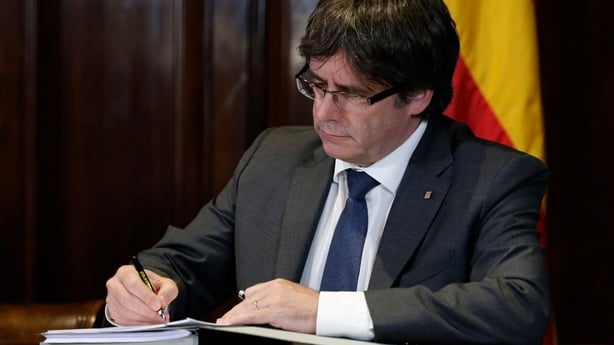Spain's state prosecutors office said it would present criminal charges against members of the Catalan parliament for voting yesterday to hold an independence referendum, which the Spanish government says is illegal.
The state prosecutor-general, Jose Manuel Maza, told reporters that his office would also present criminal charges against members of Catalonia's government for signing off on the law.
Mr Maza said he had asked Spain's security forces to investigate any preparations by the Catalan government to hold the referendum.
A majority of Catalonia's parliament voted to hold the referendum on splitting from Spain on 1 October.
MPs who opposed independence abandoned the chamber before the vote, with some leaving Catalan flags in their empty seats.
Pro-independence MPs, led by regional head Carles Puigdemont, sang the Catalan national anthem once the votes were counted.

Polls in the northeastern region show support for self-rule waning as Spain's economy improves. But the majority of Catalans do want the opportunity to vote on whether to split from Spain.
The details of the referendum, which would pose the question "Do you want Catalonia to be an independent republic?" to all Spanish citizens living in Catalonia, were revealed amid a tense atmosphere in the 135-seat regional parliament.
There will be no minimum turnout requirement to make the result of the referendum binding, Mr Puigdemont said in a recent briefing. Ballot boxes, voting papers and an electoral census are at the ready, he said.
Spanish Prime Minister Mariano Rajoy told a news conference earlier this week that the government would come down with all the force of the law to ensure no referendum would go ahead.
The Spanish government has asked the constitutional court to declare the referendum law void as soon as it is approved by the regional parliament.
The Spanish constitution states that the country is indivisible.
Courts in Spain have already suspended from office and levelled millions of euro in fines at Catalan politicians who organised a non-binding referendum in 2014, which returned a Yes vote on a low turnout.

